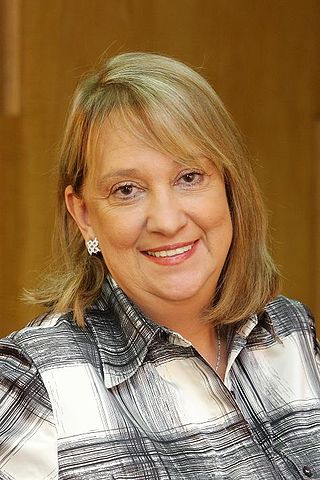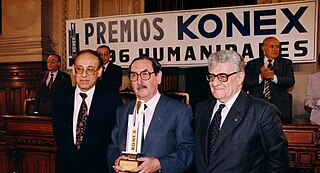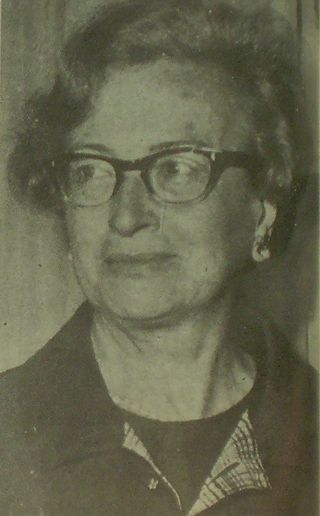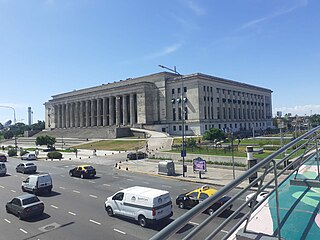Related Research Articles

The University of Buenos Aires is a public research university in Buenos Aires, Argentina. It was established in 1821. It has educated 17 Argentine presidents, produced four of the country's five Nobel Prize laureates, and is responsible for approximately 40% of the country's research output.

José María Ruda was an Argentine jurist.

The La Plata National University is a national public research university located in the city of La Plata, capital of Buenos Aires Province, Argentina. It has over 90,000 regular students, 10,000 teaching staff, 17 departments and 106 available degrees.
Eduardo Rabossi (1930–2005) was an Argentine philosopher and human rights activist.
Austral University is a private university in Argentina, based in Pilar, Buenos Aires. Austral is the best private university and the best in employability in the country according to QS University Rankings.

Ricardo Luis Lorenzetti is an Argentine judge graduated from the National University of the Littoral, Argentina, with a long national and international career. He used to be Chief Justice of the Supreme Court of Argentina (2007–2018), proposed by President Néstor Kirchner and approved by the Senate, assuming his position on December 12, 2004, covering the vacancy caused by the resignation of Justice Adolfo Vázquez. On November 7, 2006, he was appointed Chief Justice, officiated as of January 1, 2007. Currently, he is one of the five Justices of the Supreme Court. He was President of the Commission for the preparation of the Parliamentary Act to reform, update and unify the Civil and Commercial Codes of the Argentine Nation, Presidential Decree 191/2011.

Noemí Rial was an Argentine lawyer and politician who was Secretary of Labour and Vice Minister of Labour, Employment and Social Security from 2002 to 2015. She was appointed by former President Eduardo Duhalde (2002–2003) and confirmed by presidents Néstor Kirchner (2003–2007) and Cristina Fernández, elected in 2007.
Enrique de Gandía was an Argentine historian, author of over a hundred books.

Eliseo Verón was an Argentine sociologist, anthropologist and semiotician, and professor of communication sciences at Universidad de San Andrés. His work is known mainly in Spanish and French-speaking countries.

Sara Facio was an Argentine photojournalist and publisher. She was best known for having photographed, along with Alicia D'Amico, various cultural personalities, including Argentine writers Julio Cortázar, María Elena Walsh and Alejandra Pizarnik. She co-founded the publishing house "La Azotea" alongside María Cristina Orive in 1973.

Luis Ovsejevich is an Argentine lawyer and businessman, founder and president of the Konex Foundation, from its creation in 1980. Through it the Konex Awards have been granted annually since 1980 to personalities and institutions standing out for his, her or its achievements in 10 different fields. He is a lawyer graduated from the University of Buenos Aires, he exerted teaching from 1962 to 1974 in the Faculty of Law and Faculty of Economic Sciences at the University of Buenos Aires. In the 1960s he was a law professor in University of Buenos Aires and in University of Morón. He also is a piano teacher.
Teodosio César Brea was an Argentine lawyer. Brea obtained his law degree from the “Universidad de Buenos Aires” in 1950 and a Master in Comparative Jurisprudence from the New York University School of Law in 1954. He validated his law degree at the “Universidad Complutense de Madrid” and was admitted to the bar in Spain in 1976.
Gabriel B. Mindlin is a Professor of physics at the University of Buenos Aires and a scientist whose research focuses on the physical mechanisms underlying the production of songs by songbirds.
Juan Carlos Parodi is an Argentinian vascular surgeon who introduced the minimally invasive endovascular aneurysm repair (EVAR) to the world and performed the first successful endovascular repair of an abdominal aortic aneurysm on 7 September 1990 in Buenos Aires. In 1992 he was the first in the United States to perform minimally invasive aortic aneurysm surgery together with Drs. Frank Veith, Michael L. Marin and Claudio J. Schonholz. He continues to develop new techniques, including seat belt and air bag technique for cerebral protection during carotid stenting. He is recognized as a renowned pioneer in the specialty of endovascular repairs of the aorta.

Pedro R. David was an Argentine magistrate.
Amy Theresa Austin is an Argentine ecologist. She is a principal research scientist at the National Scientific and Technical Research Council in Argentina and a professor at the Faculty of Agronomy, University of Buenos Aires.

Margarita Argúas was an Argentine lawyer who pioneered participation of women into the legal profession. She was the first woman to hold a chair in the law faculty at the University of Buenos Aires, first woman to be appointed to the National Academy of Law and Social Sciences, as well as the first woman to serve on the Argentine Supreme Court of Justice of the Nation. Internationally, she was the first woman to become president of the International Law Association, serving from 1968 to 1970 and was a member of the Permanent Court of Arbitration in The Hague between 1977 and 1983. She was posthumously honored with a Konex Foundation award in 1986 for her work in Civil and International Law.
Rosa Muchnik de Lederkremer is an Argentine chemist. A doctor in chemical sciences, emeritus professor at the University of Buenos Aires (UBA), and senior researcher at the National Scientific and Technical Research Council (CONICET), she has received Konex Awards in the area of Organic Chemistry in 1983 and 2013. Her research includes major contributions in the area of glycobiology through investigating the inhibition of the key enzyme for the survival of Trypanosoma cruzi in the human body.
Eugenio Bulygin, born Yevgeny Viktorovich Bulygin was a Russian Argentine jurist and legal philosopher. During a career that spanned over 60 years covering the second half of the 20th century and the first decades of the 21st century, Bulygin established himself as one of the main representatives of legal positivism in the Latin world.

The Faculty of Law is a faculty of the University of Buenos Aires (UBA), the largest university in Argentina. It was founded alongside the university in 1821, and has consistently remained one of its largest constituent schools, presently counting with 23,790 enrolled graduate students. At the graduate level, it offers law degrees as well as legal translation and forensic calligraphy degrees, in addition to the professorship on judicial sciences.
References
- ↑ Eckstein, Gabriel (2011-07-27). "In Memoriam of Professor Julio A. Barberis". International Water Law Project Blog. Retrieved 2023-05-12.
- 1 2 3 "Juez, Julio A. Barberis" (PDF). Corte Interamericana de Derechos Humanos. Archived from the original on 2023-05-06. Retrieved 2023-05-12.
{{cite web}}: CS1 maint: bot: original URL status unknown (link) - 1 2 3 Factory, Troop Software. "Julio A. Barberis | Fundación Konex". www.fundacionkonex.org (in Spanish). Retrieved 2023-05-12.
- ↑ "La Universidad Austral creó una beca en honor a Julio A. Barberis – Parlamentario" (in Spanish). Retrieved 2023-05-12.
- ↑ "APORTES DEL JURISTA ARGENTINO JULIO A. BARBERIS AL DERECHO INTERNACIONAL" (PDF). Universidad Nacional de Cordoba.
- ↑ Eckstein, Gabriel (2011-07-27). "In Memoriam of Professor Julio A. Barberis". International Water Law Project Blog. Retrieved 2023-05-12.